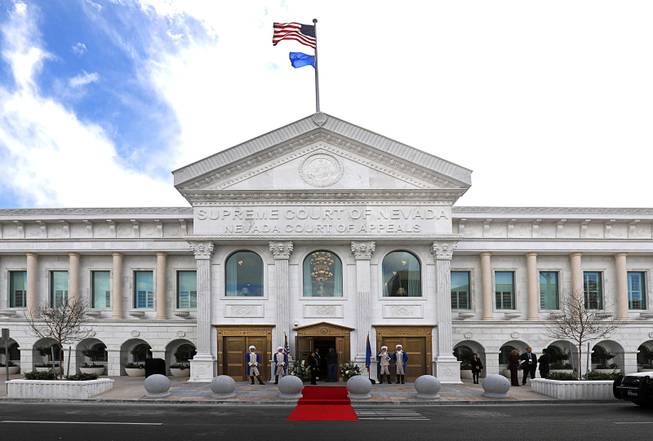
A view of the Nevada Supreme Court and Nevada Court of Appeals courthouse in downtown Las Vegas Monday, March 27, 2017.
Monday, May 3, 2021 | 5:30 p.m.
CARSON CITY — The Nevada Supreme Court weighed arguments Monday in a lawsuit filed by Republican lawmakers over how to interpret state law that requires revenue-generating proposals to win two-thirds approval in the Legislature to become law.
Since 1996, the Nevada Constitution has mandated that two-thirds of lawmakers in both chambers must approve any proposal that “creates, generates, or increases any public revenue in any form," setting a high bar for any proposal to raise taxes without bipartisan support.
Republican state senators allege that the Legislature's 2019 decision to extend two expiring revenue streams — a Department of Motor Vehicles $1 transaction fee and a payroll tax — violated the mandate because the extensions passed with simple majorities in the Democratic-controlled Legislature and didn't receive two-thirds approval.
The court's decision could have multimillion-dollar implications for the Legislature, which relies on the taxes and fees in question to balance its budget. The payroll tax is projected to generate roughly $98 million over the next two years. The decision will also signal to lawmakers how they can navigate the two-thirds requirement in future revenue battles, as they weigh taxes and fees needed to fund state services.
After a district court judge ruled in favor of the Republicans last September, attorneys for the Legislature — who represent Democratic leaders in the case — appealed the decision to the state Supreme Court.
Legislative Counsel Bureau attorney Kevin Powers and Nevada Deputy Solicitor General Craig Newby argued on Monday that extending revenue streams didn't violate the constitution because it didn't “create, generate or increase” revenue and therefore didn't require two-thirds approval.
Powers said the intent of the law “was never to hamstring the government and impair existing revenues" and pointed to state courts in Oklahoma and Oregon that had interpreted similar two-thirds requirements in a narrow manner.
He and Newby argued legislative leaders had the right to take the advice of the Legislative Counsel Bureau, which issued an opinion stating that they could extend the tax and fee without two-thirds approval.
"There is ambiguity within the term ‘increase.’ And under those circumstances, legislators are entitled to some deference ... based on separation of powers," Newby said.
Attorney Karen Peterson, representing the Republican lawmakers, disagreed.
“The words used in the constitutional provision are plain. They’re ordinary. They’re easy to understand. And they’re unambiguous,” she said.
Peterson argued that the Legislative Counsel Bureau had contradicted itself when it told the statehouse Democratic leaders that they could extend the taxes without two-thirds approval because in prior years similar extensions — for business license fees, for example — had required two-thirds approval.
If the court upholds the tax and the fee, Peterson said it would change the nature of tax expiration clauses and make it more difficult to win two-thirds approval to adopt temporary measures to raise revenue.
“Going forward, the minority is never going to agree to a sunset provision on a bill and never going to agree to a true reduction in a rate in a bill," she said.
___
Sam Metz is a corps member for the Associated Press/Report for America Statehouse News Initiative. Report for America is a nonprofit national service program that places journalists in local newsrooms to report on undercovered issues.
